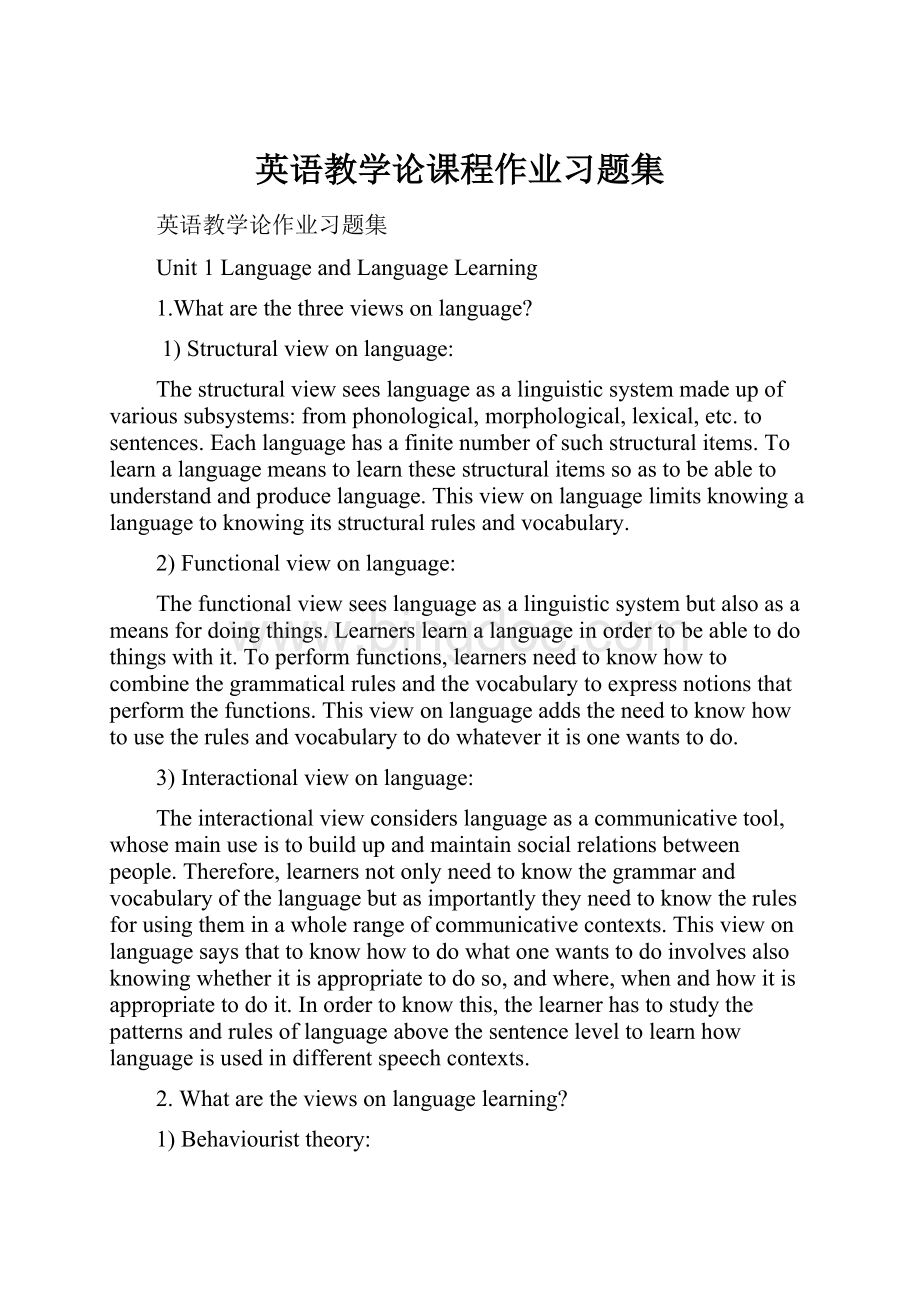英语教学论课程作业习题集Word下载.docx
《英语教学论课程作业习题集Word下载.docx》由会员分享,可在线阅读,更多相关《英语教学论课程作业习题集Word下载.docx(29页珍藏版)》请在冰点文库上搜索。

fromphonological,morphological,lexical,etc.tosentences.Eachlanguagehasafinitenumberofsuchstructuralitems.Tolearnalanguagemeanstolearnthesestructuralitemssoastobeabletounderstandandproducelanguage.Thisviewonlanguagelimitsknowingalanguagetoknowingitsstructuralrulesandvocabulary.
2)Functionalviewonlanguage:
Thefunctionalviewseeslanguageasalinguisticsystembutalsoasameansfordoingthings.Learnerslearnalanguageinordertobeabletodothingswithit.Toperformfunctions,learnersneedtoknowhowtocombinethegrammaticalrulesandthevocabularytoexpressnotionsthatperformthefunctions.Thisviewonlanguageaddstheneedtoknowhowtousetherulesandvocabularytodowhateveritisonewantstodo.
3)Interactionalviewonlanguage:
Theinteractionalviewconsiderslanguageasacommunicativetool,whosemainuseistobuildupandmaintainsocialrelationsbetweenpeople.Therefore,learnersnotonlyneedtoknowthegrammarandvocabularyofthelanguagebutasimportantlytheyneedtoknowtherulesforusingtheminawholerangeofcommunicativecontexts.Thisviewonlanguagesaysthattoknowhowtodowhatonewantstodoinvolvesalsoknowingwhetheritisappropriatetodoso,andwhere,whenandhowitisappropriatetodoit.Inordertoknowthis,thelearnerhastostudythepatternsandrulesoflanguageabovethesentenceleveltolearnhowlanguageisusedindifferentspeechcontexts.
2.Whataretheviewsonlanguagelearning?
1)Behaviouristtheory:
ThebehavioristtheoryoflanguagelearningwasinitiatedbybehavioralpsychologistSkinner,whoappliedWatsonandRaynor’stheoryofconditioningtothewayhumansacquirelanguage(Harmer,1983)Thekeypointofthetheoryofconditioningisthat“youcantrainananimaltodoanythingifyoufollowacertainprocedurewhichhasthreemajorstages,stimulus,response,andreinforcement”(Harmer1983:
30)Basedonthetheoryofconditioning,Skinnersuggestedlanguageisalsoaformofbehavior.Itcanbelearnedthesamewayasananimalistrainedtorespondtostimuli.Thistheoryoflearningisreferredtoasbehaviorism.
2)Cognitivetheory:
Thetermcognitivismisoftenusedlooselytodescribemethodsinwhichstudentsareaskedtothinkratherthansimplyrepeat.ItseemstobelargelytheresultofNoamChomsky’sreactiontoSkinner’sbehavioristtheory,whichledtotherevivalofstructurallinguistics.AccordingtoChomsky,languageisnotaformofbehaviour,itisanintricaterule-basedsystemandalargepartoflanguageacquisitionisthelearningofthissystem.Thereareafinitenumberofgrammaticalrulesinthesystemandwithknowledgeoftheserulesaninfiniteofsentencescanbeproduced.Alanguagelearneracquireslanguagecompetence,whichenableshimtoproducelanguage.
3)Constructivisttheory
Theconstructivisttheorybelievesthatlearningisaprocessinwhichthelearnerconstructsmeaningbasedonhis/herownexperiencesandwhatheorshealreadyknows.Itisbelievedthateducationisusedtodevelopthemind,notjusttoroterecallwhatislearned.JohnDewey(杜威)believedthatteachingshouldbebuiltbasedonwhatlearnersalreadyknewandengagelearnersinlearningactivities.Teachersneedtodesignenvironmentsandinteractwithlearnerstofosterinventive,creative,criticallearners.Therefore,teachersmustbalanceanunderstandingofthehabits,characteristicsaswellaspersonalitiesofindividuallearnerswithanunderstandingofthemeansofarousinglearners’interestsandcuriosityforlearning.
4)Socio-constructivisttheory
Vygotsky(前苏联心理学家维果茨基,1978)emphasizesinteractionandengagementwiththetargetlanguageinasocialcontextbasedontheconceptof“ZoneofProximalDevelopment”(ZPD「可能发展区/最近发展区」)andscaffolding「鹰架/支架/脚手架」.Thatistosay,learningisbestachievedthroughthedynamicinteractionbetweentheteacherandthelearnerandbetweenlearners.Withtheteacher’sscaffoldingthroughquestionsandexplanations,orwithamorecapablepeers’support,thelearnercanmovetoahigherlevelofunderstandingandextendhis/herskillsandknowledgetothefullestpotential.
3.Whatarethequalitiesofagoodlanguageteacher?
ThemainelementsofagoodEnglishteacherareethicdevotion,professionalqualities,andpersonalstyles.(Thentrytoexplainthesethreeelementsrespectivelyaccordingtoyourownunderstanding)
Unit2CommunicativePrinciplesandTask-basedLanguageTeaching
1.Whatiscommunicativecompetence?
Hedge(2000:
46-55)discussesfivemaincomponentsofcommunicativecompetence:
linguisticcompetence,pragmaticcompetence,discoursecompetence,strategiccompetence,andfluency.
Communicativecompetenceentailsknowingnotonlythelanguagecodeortheformoflanguage,butalsowhattosaytowhomandhowtosayitappropriatelyinanygivensituation.Communicativecompetenceincludesknowledgeofwhattosay,when,how,where,andtowhom.
2.Whatarethethreeprinciplesofcommunicativelanguageteaching?
a)thecommunicativeprinciple:
Activitiesthatinvolverealcommunicationpromotelearning.
b)thetaskprinciple:
Activitiesinwhichlanguageisusedforcarryingoutmeaningfultaskspromotelearning(Johnson1982).
c)themeaningfulnessprinciple:
Languagethatismeaningfultothelearnersupportsthelearningprocess.
3.Whatarethesixcriteriaforevaluatingcommunicativeclassroomactivities?
1)communicativepurpose
2)communicativedesire
3)content,notform
4)varietyoflanguage
5)noteacherintervention
6)nomaterialcontrol
4.WhatisTask-basedLanguageTeaching?
Task-basedLanguageteachingis,infact,afurtherdevelopmentofCommunicativeLanguageTeaching.Itsharesthesamebeliefs,aslanguageshouldbelearnedascloseaspossibletohowitisusedinreallife.Ithasstressedtheimportancetocombineform-focusedteachingwithcommunication-focusedteaching.
Unit3TheNationalEnglishCurriculum
1.WhatarethedesigningprinciplesfortheNationalEnglishCurriculum2001?
1)Aimforeducatingallstudents,andemphasisequality-orientededucation.
2)Promotelearner-centredness,andrespectindividualdifferences.
3)Developcompetence-basedobjectives,andallowflexibilityandadaptability.
4)Paycloseattentiontothelearningprocess,andadvocateexperientiallearningandparticipation.
5)Attachparticularimportancetoformativeassessment,andgivespecialattentiontothedevelopmentofcompetence.
6)Optimizelearningresources,andmaximizeopportunitiesforlearningandusingthelanguage.
2.WhatarethegoalsandobjectivesofEnglishlanguageteaching?
Thenewcurriculumisdesignedtopromotestudents’overalllanguageability,whichiscomposedoffiveinterrelatedcomponents,namely,languageskills,languageknowledge,affects,learningstrategiesandculturalunderstanding.Eachcomponentisfurtherdividedintoafewsub-categories.Languageteachingisnolongeraimedonlyfordevelopinglanguageskillsandknowledge,butexpandedtodevelopinglearners’positiveattitude,motivation,confidenceaswellasstrategiesforlife-longlearningalongwithcross-culturalknowledge,awarenessandcapabilities.
3.WhatarethechallengesfacingEnglishlanguageteachers?
1)Englishlanguageteachersareexpectedtochangetheirviewsaboutlanguagewhichisnotasystemoflinguisticknowledgebutameansforcommunication.
2)Englishlanguageteachersareexpectedtochangetheirtraditionalroleofaknowledgetransmittertoamulti-roleeducator.
3)Englishlanguageteachersareexpectedtousemoretask-basedactivitiesandputthestudentsatthecenteroflearning.
4)Englishlanguageteachersareexpectedtousemoreformativeassessmentinadditiontousingtests.
5)Englishlanguageteachersareexpectedtousemoderntechnologyinteaching,creatingmoreeffectiveresourcesforlearningandforusingthelanguage.
Unit4LessonPlanning
1.Whyislessonplanningnecessary?
Lessonplanningmeansmakingdecisionsinadvanceaboutwhattechniques,activitiesandmaterialswillbeusedintheclass.Itisobviousthatlessonplanningisnecessary.
Benefits:
1)Tomaketheteacherawareoftheaimsandlanguagecontentsofthelesson.
2)Tohelptheteacherdistinguishthevariousstagesofalessonandtoseetherelationshipbetweenthemsothatthelessoncanmovesmoothlyfromonestagetoanother.
3)Properlessonplanninggivestheteacheropportunitytoanticipatepotentialproblemsthatmayariseinclasssothattheycanbepreparedwithsomepossiblesolutionsorotheroptionsforthelesson.
4)Lessonplanninggivesteachers,especiallynoviceteachers,confidenceinclass.
5)Theteacheralsobecomesawareoftheteachingaidsthatareneededforthelesson.
6)Lessonplanninghelpsteacherstothinkabouttherelativevalueofdifferentactivitiesandhowmuchtimeshouldbespentonthem.Theteachersoonlearnstojudgelessonstagesandphaseswithgreateraccuracy.
7)Theplan,withtheteacher’scommentsandcorrections,providesauseful,time-savingreferencewhentheteachernextplansthesamelesson.
8)Lessonplanningisagoodpracticeandasignofprofessionalism.
2.Whataretheprinciplesforgoodlessonplanning?
Aims—meanstherealisticgoalsforthelesson.Thatis,theteacherneedstohaveaclearideaofwhathe/shewouldliketoachieveforthelessonorwhatoutcomesareexpectedfromthelesson.
Variety—meansplanninganumberofdifferenttypesofactivitiesandwhereposs